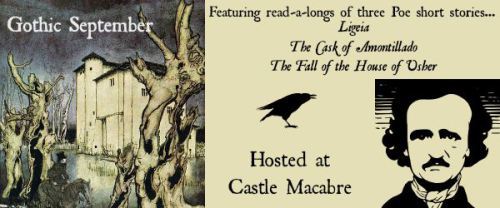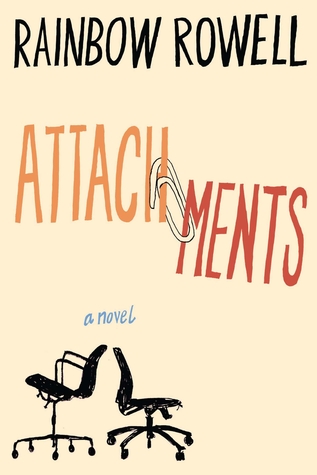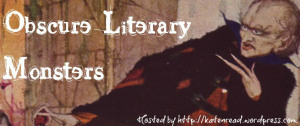Katherine Nabity's Blog, page 182
September 12, 2015
Deal Me In, Week 37 ~ “Knock, Knock, Knock”
Hosted by Jay @ Bibliophilopolis
“Knock, Knock, Knock” by Ivan Turgenev
Card picked: Five of Hearts
From: Found online at Project Gutenberg
Thoughts: “Knock, Knock, Knock” (or, “The Knocking”) is a response to Lermontov’s “The Fatalist” and the whole concept of the mysterious romantic hero. It is the story of Ilya Stepanitch Tyeglev. Tyeglev is a pretty plain guy. Not handsome, or smart, or ambitious, but…
…the stamp which distinguishes “fatal” people was discerned in him. No one of his fellow officers expected that Tyeglev would make a career or distinguish himself in any way; but that Tyeglev might do something extraordinary or that Tyeglev might become a Napoleon was not considered impossible. For that is a matter of a man’s “star”…
Indeed, a couple extraordinary events happen to Tyeglev: he rescues a puppy from drowning and cuts to a called card three times in a row. So, absolutely he’s one of those “fatal” people. Tyeglev buys into this. He’s *destined* to be notable.
One night, a friend of his spends the night at his cottage and plays a prank, secretly knocking against the wall. The noise reverberates through the building in a ghostly manner. Tyeglev believes this is a sign and rushes out into the foggy night. He then hears a woman’s voice calling “Ilyusha” and he, a man of the fatal type, knows what has happened. See, as any good romantic hero should, he has a secret tragic love. He promised to marry a young lady, but then didn’t because, even though he loved her, they weren’t of the same social class. The voice, he supposes, is her ghost calling to him since she undoubtedly has died from the disappointment. His friend is dubious, but doesn’t admit to his prank.
The next morning Tyeglev goes to confirm that the young lady killed herself and, resolute, feels that the only thing left to do is to join her. After a creepy chase through the fog, his friend finds him shot under a tree. The wound is self-inflicted. But, we find out, his fatalism has been self-inflicted too. The knocking was a prank and Tyeglev’s friend also finds out that the voice was that of a neighbor calling out to her own Ilya (not an uncommon name). Further, Tyeglev’s friend learns that the girl didn’t poison herself as Tyeglev said she did, but died of cholera. Tyeglev even insisted to the doctor that she had to have poisoned herself. And this might be what happens when a man tries to become something he isn’t…
About the Author: Ivan Turgenev is more of a realist than some of his progenitors. I didn’t get too much a sense of his flowing prose (which Nabokov praises him for), but it’s obvious from this tale that he’d rather be done with foolish romantic nonsense.
Is This Your Card?


September 11, 2015
#RIPX ~ Peril on the Small Screen
What I’ve Been Watching
Penny Dreadful, season 2 -If ever there was a TV series that embodies RIP and Gothic September, it’s Penny Dreadful. Take Victor Frankenstein (and his monster), Dorian Gray, and the cast of Dracula (minus the eponymous vampire) and add in witches, werewolves, spiritualism, and sinister wax works—basically every Victorian horror trope. Mix them all together; what do you get? A show that is less of a mess than you might expect. Sure, Penny Dreadful is a little melodramatic, that’s part of the fun, but it somehow avoids being completely over the top. The only thing missing are Victorian era magicians!
Arthur & George – This is a three-part series currently airing on PBS in the US. (Check your listings or online!) It’s based on a novel by Julian Barnes (haven’t read it…yet) about Sir Arthur Conan Doyle’s investigation into the accusation leveled against an Indian solicitor. It’s based on a true story, although I have a feeling the truth (and probably the book) has more to do with advocacy than Sherlockian detection. I’ve only watched the first episode, but Doyle and his secretary make a great team and there are a few honest-to-goodness creepy moments.
What I’m Looking Forward To
Sleepy Hallow, returning Oct. 1st – Sleepy Hallow *is* soap-operatic and over-the-top, but the friendship between Abbie and Ichabod is so appealing. They’re my favorite TV duo. And you’d think that Ichabod dealing with the 21st century would get old, but it really doesn’t.


September 8, 2015
Review ~ Showdown at Guyamas
This book was provided to me by Open Road Media via NetGalley in exchange for an honest review.
Showdown at Guyamas by Paul Lederer
In the thrilling first installment in this genre-busting series, Spectros journeys to Mexican mining country to confront the conjurer who kidnapped his bride.
A narrow carriage rumbles through the treacherous mountains of Sonora. Inside, surrounded by countless books and pieces of scientific equipment, rides Dr. Spectros—the most brilliant magician of the Old West. For years, he has pursued the fiendish sorcerer Blackschuster, who long ago stole the only woman the doctor ever loved. Spectros has now chased his nemesis to Mexico, where he discovers a town just as rotten as the conjurer who hides there.
Blackschuster has come in search of the silver he requires to keep the bride of Spectros trapped in eternal sleep. With the help of his associates, the gunslinger Ray Featherskill, the knife expert Inkada, and the hulking bruiser Montak, Spectros corners his enemy, but defeating him will take a magic more powerful than any the world has ever seen. (via Goodreads)
According to Goodreads, Showdown at Guyamas is a mere 138 pages long. It probably needs to be twice that. Lederer does a great job with setting (almost too good since we’re given an “establishing shot” for each scene) and writes very clear action scenes. I was never confused about where I was or what was going on. We have chases, showdowns, and knife-fights; all of which are handled wonderfully. It was the characters that were lacking for me.
I understand that some stories should be about the events, the plot, but in the case of this supernatural Western, character *reputation* is important. Minor characters recognize Kid Soledad and know his reputation, but as a reader, I really didn’t. Why not take time to establish the myth of Kid Soledad with tales being told by other characters? Maybe some of these tales are so fantastical that they can’t be true, but they are because Spectros/Soledad is a sorcerer. Likewise, Blackschuster and local bad guy Tomlinson get a few evil villain soliloquies, but we never see any of their evil deeds. I was never particularly invested in the character of Elisabeth because I was only told about her predicament. As for Doctor Spectros’ gang? This is the first novel in the series; I would have loved more of an origin story about each of these three odd-balls. I also didn’t have a good handle on Spectros’ magic. When adding fantasy elements, rules are important.
As far as series go, this one wrapped up its story while providing enough of a hook for the next book. That’s something I appreciate in any series. The plot itself is a little melodramatic, but I was okay with that. I just wish that the characters had been written with more detail.
Publishing info, my copy: Kindle version. Despite its Dec. 2014 pub date, I hope the version I downloaded was not the final version. There were a surprising number of typos and it felt like the formatting could have handled changes of POV better.
Acquired: NetGalley
Genre: Supernatural Western


September 7, 2015
Gothic September ~ “Ligeia” by Edgar Allan Poe
 Gothic September is hosted by Michelle at Castle Macabre. Visit for all the details!
Gothic September is hosted by Michelle at Castle Macabre. Visit for all the details!
The first short story for the Gothic September Poe Read-a-long is “Ligeia.”
Man doth not yield him to the angels, nor unto death utterly, save only through the weakness of his feeble will.
“Ligeia” begins with this quote from Joseph Glanvill, a 17th century natural philosopher and atheist and also a proponent of the supernatural and witchcraft. Sometimes, epigraphs are only tentatively connected to the text, but this quote is repeated three times within the story!
Right off the bat, we learn that there is some mystery to Lady Ligeia. Our narrator doesn’t quite remember how he came to know her and realizes that he never even knew her last name! She is attractive, but her classical beauty is queered by her very large eyes and her unfathomable expressions. Not only is Lady Ligeia a looker, but she’s smart too! She surpasses our narrator’s knowledge in the metaphysical investigations of which they are both interested. Alas, as women tend to do in Poe stories, Ligeia dies. On her deathbed, she quotes Mr. Glanvill.
At this point, our narrator needs a change of scenery. He leaves the old city on the Rhine where he and Ligeia lived and purchases an abbey in some remote part of England. He remarries too. Rowena is the photo negative of Ligeia–blonde and blue-eyed where Ligeia was dark. I also kind of get the feeling that our narrator married her more for her title than any other attributes. Poe indulges in an intricate description of the bridal chamber, including the granite sarcophagi in each corner of the octagonal room and the phantasmagorical wall hangings. Right about here is where one could write a whole separate Gothic novel about poor Rowena living, *ahem* briefly, in the shadow of Ligeia.
I’ve been thinking recently about first person narrators and how bland they can be, how normal, and how we as readers have come to see them as merely the clear glass through which we see the story. A first person narrator should never be a clear glass; we should probably be aware of the narrator’s prejudices and state of mind. There are no such worries when you’re reading Poe. Our narrator is noticeably obsessed and haunted, and I wonder a little about what part he might have played in the story’s ending.
 This story also counts for RIP X!
This story also counts for RIP X!


September 6, 2015
#ROW80 ~ September 6th Update
Writing
Update: I finished the first draft of the first Abbott story on Monday/Tuesday and Eric read Tuesday/Wednesday. I have a pretty good idea of what I need to change/improve in the second draft. …But I haven’t gotten much work done on it yet. I did a little research for story #2 on Wednesday morning and then was sidetracked with a few Other Things.
Goal for the Week: Finish rewrites by end day Monday, Sept. 14th.
Blogging
R.eaders I.mbibing P.eril X started on Tuesday! I have an ambitious reading/blogging plan:
Monday: Gothic September Readalong
Tuesday: Book Review
Friday: Peril on the Screen Update
Saturday: Deal Me In
Sunday: ROW80 Update
We’ll see how *that* goes.
Other Things
All of Fall League is sorted out. Teams are named and updated. The schedule is posted. Huzzah. Now, it’s all maintenance unless I want to work on the pages I haven’t converted.
So, the Python class I was taking online was giving me fits. I had started my Python adventure with a Programming for Everyone (PR4E) class through the University of Michigan at the beginning of the year. Unfortunately, U of M only offered that class and, to continue my programming education, I decided to take an Intro to Interactive Programming class from Rice. Part 1 of Intro to Interactive was considerably more difficult than PR4E, but I managed. And then summer happened and I wasn’t able to take part 2 until now. I’d spent a goodly portion of Weds. and Thurs. on the quizzes and the week’s mini project and I was stressed. Programming is not for the person who has usually gotten by in mathematics and hard sciences on a combination of memorization and imitation. On Friday, U of M announced that they’d be expanding PR4E into a specialization track and adding another set of classes for web design. They’re beginning in a couple weeks. I probably could have toughed out Intro to Interactive, pt. 2, but U of M’s classes are informatics aspected, which will probably be more useful to me than designing simple games, and I like the philosophy of the U of M classes better. …And I still feel like a coward for dumping Intro to Interactive, pt. 2…
 #ROW80 is a blog hop!
#ROW80 is a blog hop!
Visit other Row-ers and encourage them!


September 5, 2015
Deal Me In, Week 36 ~ “The Martian Agent”
Hosted by Jay @ Bibliophilopolis
“The Martian Agent, A Planetary Romance” by Michael Chabon
Card picked: King of Spades
From: McSweeney’s Mammoth Treasury of Thrilling Tales, ed. by Michael Chabon
Thoughts: Franklin and Jefferson’s father is a traitor to the Crown. The entire family is apprehended as they raced to the border after General Custer’s surrender (this is seemingly the second Revolutionary War). Their father is executed, their mother dies of a stroke, and the boys are claimed by their Tory uncle, aeronaut Sir Thomas Mordden. And…
And, that’s all of this story that readers get. There’s a note that the story will continue in McSweeney’s Second Mammoth Treasury of Thrilling Tales…which does not exist.
On one hand, I’m annoyed. This is probably my favorite pieces of steampunk fiction. There are armored “land sloops” and airships and, obviously, a dash of alternative history in which the British Empire never lost the colonies. And it’s my favorite because it all takes a back seat to the relationship that the two boys, Frank and Jeff, have with each other and the world. (One could almost call that a Chabonian trope, but I like it.)
On the other hand, an i09 story details the rest of what Chabon had in mind—that this would be a Mars adventure a la John Carter of Mars. That interests me a lot less. I’d probably still read it though…


September 4, 2015
10 Books of Summer Wrap-Up
 Cathy at 746 Books hosted 20 Books of Summer from June 1st to Sept 4th
Cathy at 746 Books hosted 20 Books of Summer from June 1st to Sept 4th
A opted for the shorter version of the challenge: 10 Books of Summer. I’m a slow reader and I’m bad at sticking to lists, but I didn’t do too badly. I finished seven books.
Best Horror of the Year edited by Ellen Datlow – Reviewed
The Manitou by Graham Masterton – Reviewed
The Turn of the Screw by Henry James – Reviewed
The Thirteenth Tale by Diane Setterfield – Reviewed
The Rise of the Indian Rope Trick by Peter Lamont – Reviewed
The Victorian Internet by Tom Standage – Reviewed
Citizen: An American Lyric by Claudia Rankine – Reviewed
The winners? The nonfiction. The Rise of the Indian Rope Trick and The Victorian Internet made for great vacation travel reading!
A couple of notes:
I traded out Linking Rings by James David Robenalt for The Rise of the Indian Rope Trick pretty early in the summer. Just a matter of taste.
I had two DNFs: Girl Meet Class by Karin Gillespie and It’s What I Do by Lynsay Addario. Both just didn’t work for me.
I also got about a third of the way through Freddy’s Book by John Gardner. It’s a book I’ll probably finish, but right now it’s kind of slow and…odd.


September 1, 2015
Review ~ Attachments
“Hi, I’m the guy who reads your e-mail, and also, I love you . . . ”
Beth Fremont and Jennifer Scribner-Snyder know that somebody is monitoring their work e-mail. (Everybody in the newsroom knows. It’s company policy.) But they can’t quite bring themselves to take it seriously. They go on sending each other endless and endlessly hilarious e-mails, discussing every aspect of their personal lives.
Meanwhile, Lincoln O’Neill can’t believe this is his job now- reading other people’s e-mail. When he applied to be “internet security officer,” he pictured himself building firewalls and crushing hackers- not writing up a report every time a sports reporter forwards a dirty joke.
When Lincoln comes across Beth’s and Jennifer’s messages, he knows he should turn them in. But he can’t help being entertained-and captivated-by their stories.
By the time Lincoln realizes he’s falling for Beth, it’s way too late to introduce himself.
What would he say . . . ? (via Goodreads)
I needed slump-buster. After the stress of returning from vacation, I needed a light-ish, enjoyable read. And that meant picking up one of Rainbow Rowell’s books.
Attachments is like my favorite type of romantic comedy. The circumstances are a little odd-ball. The characters have problems other than being partnerless. There are things going on that are separate from their romance. The world is populated by normal people. No one’s overly glamorous, but everyone is as funny as we all wish we were. Add to that, Attachments has that geeky quality that I expect from Rowell, and it’s set in my hometown. There’s a quip in the book about Sandra Bullock rom-coms, but this book does remind me of one of my favorite chick flicks, While You Were Sleeping.
I will say that I had a bit of a hard time sorting Beth and Jennifer out. It was less about their voices and more that I couldn’t, for part of the book, remember who was with Mitch and who was with Chris. I kind of wish there would have been a cast page like you find at the the beginning of a play. Considering that we only see the world from Lincoln’s POV and only “hear” from Beth and Jennifer through their emails, Beth and Jennifer really are like reading the dialog from a play, a little unmoored from the solid story. But this is really a minor annoyance.
Overall, it was exactly the book I needed last week.
Publishing info, my copy: Penguin Publishing Group, eLibrary edition
Acquired: Tempe OverDrive Digital Collection
Genre: Romantic Comedy


August 31, 2015
Deal Me In, Week 35 ~ “Rappaccini’s Daughter”
Hosted by Jay @ Bibliophilopolis
“Rappaccini’s Daughter” by Nathaniel Hawthorne
Card picked: Two of Clubs – my last wild card! I decided to pull from my list of Obscure Literary Monsters
Thoughts: When found in the anthology Mosses from an Old Manse and other stories, this story is titled “Rappaccini’s Daughter [from the writings of Aubepine]” and there’s a preface about the esoteric M. de l’Aubepine. The “translator” notes that Aubepine is prone to fantasy and allegory and his characters barely have the semblance of real people. In this way, Hawthorne is providing with a wink and a nudge an explanation for his fantastic allegory. Some online versions of the story skip this bit.
Rappaccini is a great scientist; a genius with plants. He has “created” incredibly toxic plants, ones that he can’t even touch or breath in their fragrance. A young doctor, Giovanni Guasconti, has rented the apartment overlooking Rappaccini’s courtyard garden and observes that the mad scientist’s lovely daughter, Beatrice, can tend to the plants without ill effects. He is, of course, smitten. It doesn’t matter that one of Rappaccini’s envious colleagues warns him away from the father-daughter pair or that small animals and insects seem to fall dead when within proximity to her very breath. Amazingly, Giovanni is shown a secret entrance to Rappaccini’s garden and begins to meet with Beatrice on a regular basis. Nothing good can come of this…
Over and over, Hawthorne states that Rappaccini is a true scientist–he doesn’t let silly things like ethics and empathy get in his way. I’m sure Hawthorne means well with such a warning, especially in an era when the biological sciences were taking a leap forward, but these sort of stories always strike me as a bit hysterical. There’s also a strong nature/nurture theme going on here, though I doubt that Hawthorne would have stated in that manner. Time and time again, Giovanni ignores Beatrice’s faults in favor of her looks and her “heavenly” nature. He overlooks any influence her father has had over her in the belief that her nature will save her. This isn’t the case; it’s Rappaccini’s nurturing that dooms her. There’s also a hint of the thought that Giovanni has been sullied by this woman. There are plenty of Adam, Eve, and garden references; we all know how that ended.


August 30, 2015
Deal Me In, Lunar Extra ~ “The Birds”
Hosted by Jay @ Bibliophilopolis
“The Birds” by Daphne du Maurier
Card picked: An Ace
Thoughts: It’s funny how bent out of shape readers sometimes get about book-to-movie adaptations. Fidelity to the source material is usually the sticking point, but I wonder if it’s only at the extreme ends of the faithfulness spectrum that readers are happy. On one end is an adaptation that is extremely faithful. The characters, the setting, the plot are all what the reader knows. In the middle, there are adaptations that fall short. Maybe a character was added, or a new subplot was introduced. Maybe the actors don’t look like they should. These deviations usually leave readers hating the film. On the other end, there are adaptations like The Birds.
The Alfred Hitchcock directed film is based on a short story by Daphne du Maurier, but it’s really only based on the underlying concept of the story by du Maurier. In both, for reasons unknown, birds en masse begin viciously attacking people. The film is set up the coast from San Francisco in the early 60s. It veers close to being a romantic comedy with Tippi Hedren as a free living socialite and Rod Taylor as a handsome home-body lawyer. But then, the birds attack and the whole thing becomes a tense, well-made catastrophe survival film.
Du Maurier’s story takes place in Cornwall. The main character is Nat, a veteran of WWII. Due to war-time disability he has a pension and works on a farm half-time though he does seem able-bodied. On the third of December, the weather turns and the birds start acting strangely. With air raid experience (even at publication date, the end of WWII wasn’t even a decade in the past), Nat knows what to do to keep his family safe. The frigid east wind is given as the explanation as to why the birds have gone against their nature. That might be as well be as good of an explanation as anything for the inexplicable horrors that Europe had recently endured.
Which is better? It’s like apples and tomatoes. Both are fruits. Both are delicious. But maybe we like them both because they *are* different rather than because they are similar










